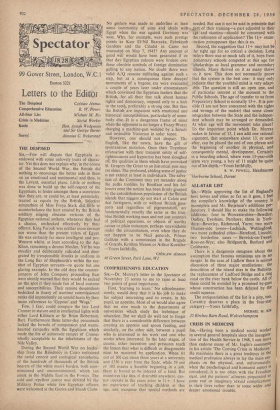CRISIS IN MEDICINE SIR,—Having been a medical social worker in
several general hospitals since the inaugura- tion of the Health Service in 1948, I can more than endorse many of Mr. Inglis's comment! in his article The Coming Crisis in Medicine.' He maintains there is a great tendency in the medical profession always to lay the main elm phasis on the physical, and, unfortunate'?" when the psychological and humanist aspect IS considered, it is too often with the Freudian slant, and the patients' ailments pinpointed to some real or imaginary sexual complications in, their lives' rather than to some wider and deeper emotional trouble.
I have had the temerity to say outright to some of my medical colleagues that in their eyes the patient is too often regarded as a car being brought to the garage to have the car- buretter cleaned or the engine decarbonised. Perhaps one of the tendencies of modern medicine is over-specialisation. If the patient is seen by a rectal or genito-urinary surgeon about some trouble in the lower part of his anatomy and then passed on to the ear, nose and throat specialist for a hearing aid, the whole personality is all too easily forgotten. Actually the treatment of Mr. Brown as Mr. Brown the bricklayer, who is worried about his wife and family and whether he will be able to climb ladders again, in other words Mr. Brown as a person, is our chief concern as almoners. Unfortunately, we too often find we are fighting a losing battle against the con- sultant to whom he is only known as case No. 2002, a 'perforated gastric ulcer.'
In conclusion may I quote the recent words of a busy general practitioner, not an orthodox religious man : 'The out-patient clinics are filled with mental cases because so many people have lost their faith and have nothing on which to hold.'—Yours faithfully,
SOCIAL WORKER



























 Previous page
Previous page